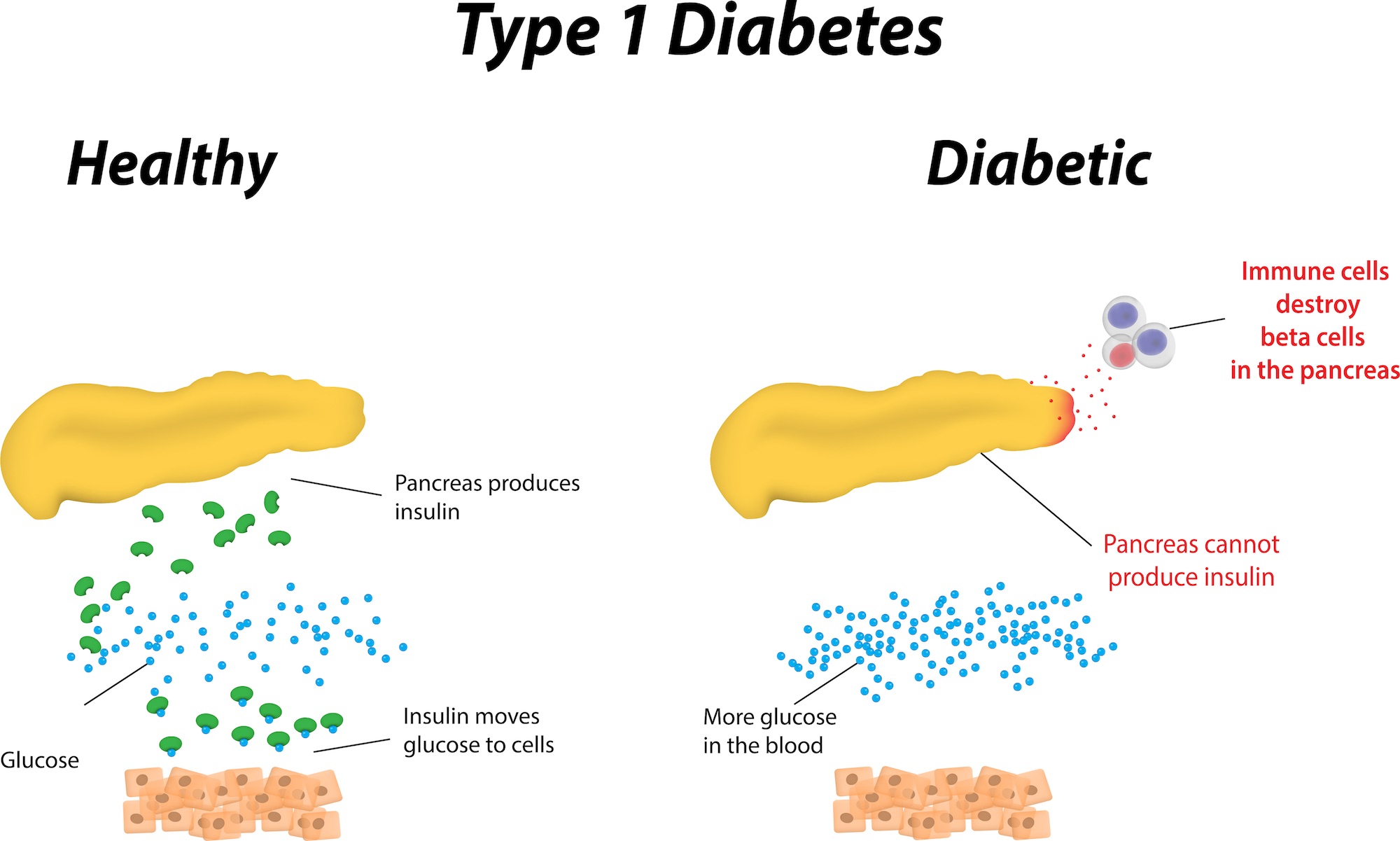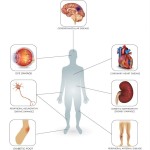- Home
- Dr Sultan Linjawi
Type 1 Diabetes
Type 2 Diabetes
Prediabetes
Gestational Diabetes
- Diabetes Information
- Testimonials
How can type 1 diabetes be prevented?

What is type 1 diabetes?
Type 1 diabetes explained simply
Type 1 diabetes is elevated blood sugars due to an absence or deficiency of insulin. In diabetes, an increase in blood glucose levels occur when glucose can’t get into your fat and muscle cells where it is needed. In order for a cell in your body to gain access to glucose, it needs a small molecule called insulin. This ‘key’ unlocks the door into the cell. People with type 1 diabetes no longer produce insulin for a number of reasons.
Type 1 Diabetes Content |
|---|
| Type 1 Program |
| Overview |
| Risk Factors |
| Symptoms |
| Diagnosis |
| Complications |
| Treatment |
| Diet |
| Monitoring |
| Tools |
| Mental Health |
| Prevention |
Type 1 diabetes explained in detail
Type 1 diabetes occurs when the pancreas, or more specifically specialised cells within the pancreas called beta cells, fail to produce insulin. Most people with type 1 diabetes develop the condition when the immune system attacks and destroys the beta cells. This is why type 1 diabetes is referred to as an autoimmune disease. Why this occurs is the source of much scientific investigation but put simply it is likely that the immune system is confused and recognises beta cells as being a foreign object (such as a virus) and wages a war against them. The fall in insulin production can either be rapid or slow. People with type 1 can therefore either develop symptoms rapidly over a few weeks or months or more slowly over a few years.
Type 1 diabetes can even occur in someone who has had their pancreas removed. In this instance a person can develop type 1 immediately after the operation. This is however an unusual cause.
Who is at risk of type 1 diabetes?
The simple answer: anyone. Although it is more likely if someone in your family has type 1 or perhaps another autoimmune disease like coeliac disease, Addison's disease, pernicious anaemia or autoimmune thyroid disease. It can occur at any age but typically doesn’t develop in the first year of life. Even though it is often associated with children, half the people who develop type 1 are over the age of 30.
To learn more about the risk factors of type 1 diabetes, you can read our article What are the risk factors of developing type 1 diabetes?
Prevention and reversal strategies
There are a number of different agents that have been studied to decrease the immune-mediated destruction of beta cells in the pancreas. These include immunosuppressive and immunomodulatory agents and other drugs that may be given alone or in combination to decrease beta cell destruction (Prediction and Prevention of Type 1 Diabetes: Progress, Problems, and Prospects). Most of the studies that have been conducted, have focused on preserving any remaining beta-cell function in people who have been recently diagnosed with type 1 diabetes.
Teplizumab (Anti-CD3) Prevention Study
In June 2019, TrialNet presented findings from their most recent study (Teplizumab for treatment of type 1 diabetes (Protégé study): 1-year results from a randomised, placebo-controlled trial) at the 2019 American Diabetes Association’s 79th Scientific Sessions. The study was the first of its kind to demonstrate the potential for preventing type 1 diabetes in those who are at a high risk of developing the condition. The study showed that the immunotherapy drug teplizumab delayed the diagnosis of type 1 diabetes, on average, by 2 years in children and adults at high risk.
There were 76 people who participated in the 2-year study and were considered high risk for developing type 1 diabetes. Of those 76 people, 55 were under the age of 18. All of the participants were relatives of people who had type 1 diabetes, had two or more autoantibodies, and abnormal blood glucose levels as identified by TrialNet’s Pathway to Prevention study.
Previously, studies using teplizumab demonstrated prolonged insulin production in people who had been recently diagnosed with type 1 diabetes. This study showed that teplizumab is able to interfere with the body’s own immune destruction of the beta cells in the pancreas.
More research still needs to be done
It’s still early days and more research and trials need to be done into the prevention of type 1 diabetes.
What should I do next?
If you experience any symptoms of type 1 diabetes or you have risk factors for developing type 1 diabetes, it is important to get tested for as soon as possible. Some people are at higher risk and need regular testing.
By diagnosing and treating the type 1 diabetes early, it means you can decrease the risk of developing or delay any further health complications of type 1 diabetes, for example nerve damage, blindness, and heart disease. It is important to know that diagnosing type 1 diabetes should not rely solely on using a Hb A1c test.
Once you learn what your type 1 diagnosis is, or if you already have type 1 diabetes, the next most important step is to become educated. You can join the 12-week Type 1 Diabetes Program to help you learn how best to manage the condition. For example, you can learn how best to monitor blood glucose levels in type 1 diabetes. The program is personalised and tailored, giving you more of the content that you want. The program also helps you to stay motivated and teaches you what changes you need to make. The first week is free and full of helpful and crucial information.
Interested in more information on type 1 diabetes?
Follow the links below to learn more about type 1 diabetes.






